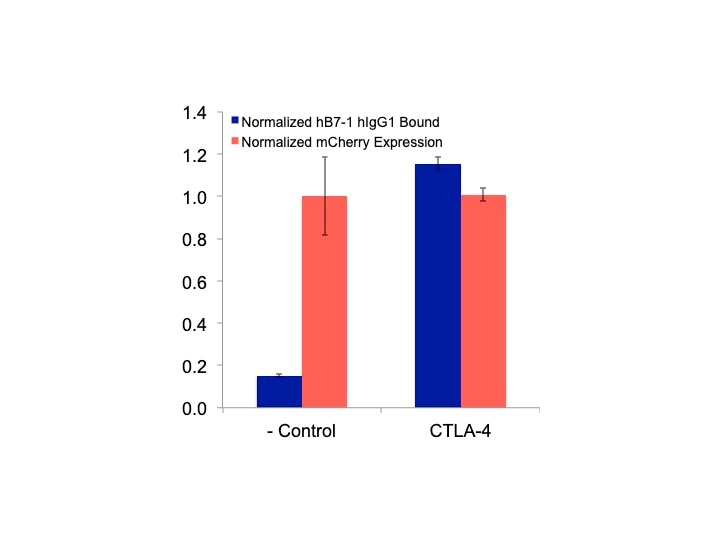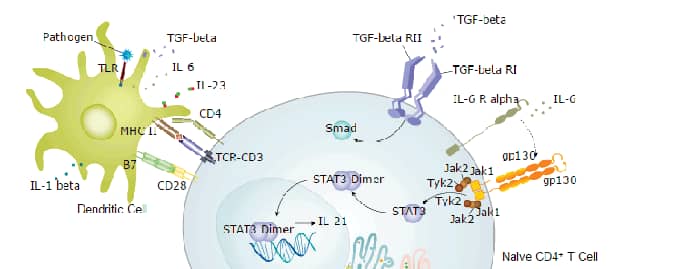Recombinant Human B7-1/CD80 Fc Chimera His-tag Protein, CF Summary
Product Specifications
| Human B7-1 (Val35-Asn242) Accession # NP_005182 |
IEGRMD | Human IgG1 (Pro100-Lys330) |
6-His tag |
| N-terminus | C-terminus | ||
Analysis
Product Datasheets
Carrier Free
CF stands for Carrier Free (CF). We typically add Bovine Serum Albumin (BSA) as a carrier protein to our recombinant proteins. Adding a carrier protein enhances protein stability, increases shelf-life, and allows the recombinant protein to be stored at a more dilute concentration. The carrier free version does not contain BSA.
In general, we advise purchasing the recombinant protein with BSA for use in cell or tissue culture, or as an ELISA standard. In contrast, the carrier free protein is recommended for applications, in which the presence of BSA could interfere.
140-B1
| Formulation | Lyophilized from a 0.2 μm filtered solution in PBS. |
| Reconstitution | Reconstitute at 100 μg/mL in sterile PBS. |
| Shipping | The product is shipped at ambient temperature. Upon receipt, store it immediately at the temperature recommended below. |
| Stability & Storage: | Use a manual defrost freezer and avoid repeated freeze-thaw cycles.
|
Reconstitution Calculator
Background: B7-1/CD80
B7-1/CD80 and B7-2/CD86, together with their receptors CD28 and CTLA-4, constitute one of the dominant co-stimulatory pathways that regulate T- and B-cell responses (1). Although both CTLA-4 and CD28 can bind to the same ligands, CTLA-4 binds to B7-1 and B7-2 with a 20-100 fold higher affinity than CD28 and is involved in the down-regulation of the immune response (2-6). Mature human B7-1 consists of a 208 aa extracellular domain (ECD) with two immunoglobulin-like domains, a 21 aa transmembrane domain, and a 25 aa cytoplasmic domain (7). Within the ECD, human B7-1 shares 50% aa sequence identity with mouse and rat
B7-1. Alternative splicing generates a 30 kDa soluble isoform that lacks the transmembrane segment and retains the ability to bind CD28 and CTLA-4 and an isoform that lacks the second Ig-like domain and the transmembrane segment (8). Both human and mouse B7-1 and B7-2 can bind to either human or mouse CD28 and
CTLA-4 (1). B7-1 is expressed on activated B cells, activated T cells, and macrophages. B7-2 is constitutively expressed on interdigitating dendritic cells, Langerhans cells, peripheral blood dendritic cells, memory B cells, and germinal center B cells (2).
- Ville, S. et al. (2015) Front. Immunol. 6:411.
- Azuma, M. et al. (1993) Nature 366:76.
- Freeman, G.J. et al. (1993) Science 262:909.
- Chen, C. et al. (1994) J. Immunol. 152:4929.
- Freeman, G.J. et al. (1993) J. Exp. Med. 178:2185.
- Lanier, L. et al. (1995) J. Immunol. 154:97.
- Freeman, G.J. et al. (1989) J. Immunol. 143:2714.
- Kakoulidou, M. et al. (2007) Scand. J. Immunol. 66:529.
Citations for Recombinant Human B7-1/CD80 Fc Chimera His-tag Protein, CF
R&D Systems personnel manually curate a database that contains references using R&D Systems products. The data collected includes not only links to publications in PubMed, but also provides information about sample types, species, and experimental conditions.
11
Citations: Showing 1 - 10
Filter your results:
Filter by:
-
Nonimmune cell-derived ICOS ligand functions as a renoprotective alphavbeta3 integrin-selective antagonist
Authors: KH Koh, Y Cao, S Mangos, NJ Tardi, RR Dande, HW Lee, B Samelko, MM Altintas, VP Schmitz, H Lee, K Mukherjee, V Peev, DJ Cimbaluk, J Reiser, E Hahm
J. Clin. Invest., 2019-03-18;129(4):1713-1726.
Species: Human
Sample Types: Recombinant Protein
Applications: Surface Plasmon Resonance (SPR -
An Activating Janus Kinase-3 Mutation Is Associated with Cytotoxic T Lymphocyte Antigen-4-Dependent Immune Dysregulation Syndrome
Authors: H Sic, M Speletas, V Cornacchio, M Seidl, M Beibel, B Linghu, F Yang, E Sevdali, AE Germenis, EJ Oakeley, E Vangreveli, AW Sailer, E Traggiai, H Gram, H Eibel
Front Immunol, 2017-12-15;8(0):1824.
Species: Human
Sample Types: Whole Cells
Applications: Flow Cytometry -
Idelalisib and caffeine reduce suppression of T cell responses mediated by activated chronic lymphocytic leukemia cells
Authors: BD Hock, SA MacPherson, JL McKenzie
PLoS ONE, 2017-03-03;12(3):e0172858.
Species: Human
Sample Types: Whole Cells
Applications: Bioassay -
A CD80-Biased CTLA4-Ig Fusion Protein with Superior In Vivo Efficacy by Simultaneous Engineering of Affinity, Selectivity, Stability, and FcRn Binding
Authors: Lutz Jermutus
J. Immunol., 2016-11-23;0(0):.
Applications: Bioassay -
Genomic landscape of cutaneous T cell lymphoma.
Authors: Choi J, Goh G, Walradt T, Hong B, Bunick C, Chen K, Bjornson R, Maman Y, Wang T, Tordoff J, Carlson K, Overton J, Liu K, Lewis J, Devine L, Barbarotta L, Foss F, Subtil A, Vonderheid E, Edelson R, Schatz D, Boggon T, Girardi M, Lifton R
Nat Genet, 2015-07-20;47(9):1011-9.
Species: Human
Sample Types: Whole Cells
Applications: Flow Cytometry -
Establishment of long-term tolerance to SRBC in dogs by recombinant canine CTLA4-Ig.
Authors: Graves SS, Stone D, Loretz C, Peterson L, McCune JS, Mielcarek M, Storb R
Transplantation, 2009-08-15;88(3):317-22.
Species: Canine
Sample Types: Serum
Applications: ELISA (Capture) -
Endoglycan, a member of the CD34 family of sialomucins, is a ligand for the vascular selectins.
Authors: Kerr SC, Fieger CB, Snapp KR, Rosen SD
J. Immunol., 2008-07-15;181(2):1480-90.
Species: Human
Sample Types: Whole Cells
Applications: Bioassay -
Sulfated polysaccharides identified as inducers of neuropilin-1 internalization and functional inhibition of VEGF165 and semaphorin3A.
Authors: Narazaki M, Segarra M, Tosato G
Blood, 2008-02-13;111(8):4126-36.
Species: Human
Sample Types: Recombinant Protein
Applications: Control -
The soluble forms of CD28, CD86 and CTLA-4 constitute possible immunological markers in patients with abdominal aortic aneurysm.
Authors: Sakthivel P, Shively V, Kakoulidou M
J. Intern. Med., 2007-04-01;261(4):399-407.
Applications: ELISA (Standard) -
ICOS cooperates with CD28, IL-2, and IFN-gamma and modulates activation of human naive CD4+ T cells.
Authors: Mesturini R, Nicola S, Chiocchetti A, Bernardone IS, Castelli L, Bensi T, Ferretti M, Comi C, Dong C, Rojo JM, Yagi J, Dianzani U
Eur. J. Immunol., 2006-10-01;36(10):2601-12.
Species: Human
Sample Types: Whole Cells
Applications: Bioassay -
Ligand-induced internalization selects use of common receptor neuropilin-1 by VEGF165 and semaphorin3A.
Authors: Narazaki M, Tosato G
Blood, 2006-01-19;107(10):3892-901.
Applications: ELISA (Standard)
FAQs
No product specific FAQs exist for this product, however you may
View all Proteins and Enzyme FAQsReviews for Recombinant Human B7-1/CD80 Fc Chimera His-tag Protein, CF
Average Rating: 5 (Based on 1 Review)
Have you used Recombinant Human B7-1/CD80 Fc Chimera His-tag Protein, CF?
Submit a review and receive an Amazon gift card.
$25/€18/£15/$25CAN/¥75 Yuan/¥2500 Yen for a review with an image
$10/€7/£6/$10 CAD/¥70 Yuan/¥1110 Yen for a review without an image
Filter by:
Cells expressing a negative control or hCTLA-4 as mCherry fusions were treated with 0.25 ug of hB7-1 hIgG1. Cells were analyzed by flow cytometry with binding detected using an anti-human 488 secondary antibody.






